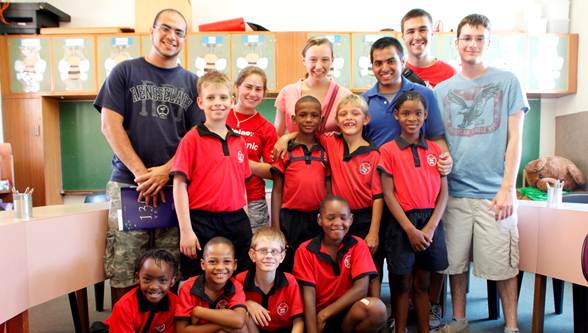Posted September 19, 2011

The second Undergraduate Seminar Series in Global Health was held Tuesday, April 3, 2012 in Academy Hall. We were happy to welcome Dr. Eric Ledet of the BME Department, who presented a talk titled, "A Tale of Two Systems: Immersion in South African Health Care."
Adequate healthcare remains a significant challenge in developing nations. State-of-the-art technology and equipment are often unsustainable. Accessibility of facilities is often prohibitive due to limited infrastructure. Even when resources are adequate in medical facilities, home healthcare for chronic diseases can be substantially limited by living conditions.
South Africa is both a developed and developing country. This dichotomy is reflected in its healthcare system. Effectively, there are two healthcare systems in South Africa: a private for-profit system analogous to many developed nations and a public system where all aspects of care are the responsibility of the state. The burden on the public system is immense, particularly in resource-challenged areas of the country. In spite of an overwhelming patient base, infrastructure challenges, and some of the highest prevalence of chronic diseases in the world such as HIV and TB, the system is effective. It is incredibly challenged, but it is effective.
Sustainable biomedical technology can help the South African healthcare system and healthcare systems in other developing nations. In January 2012, Professor Eric Ledet and six Rensselaer undergraduate students traveled to the Western Cape region of South Africa. Hosted by Stellenbosch University, they were immersed for two weeks in the South African healthcare system – public and private, urban and rural. They experienced first-hand the strengths and challenges of the system. They have returned to RPI having identified numerous opportunities for biomedical innovation.
In this seminar, Dr. Ledet will discuss some of the critical challenges of healthcare in developing nations, with special emphasis on the South African public system. He will discuss the role of sustainable biomedical technology in these unique environments.
The inaugral Undergraduate Seminar Series in Global Health was held September 27, 2011. We were pleased to welcome Dr. Gordana Vunjak-Novakovic of Columbia University, who presented a talk titled, "Engineering Functional Human Tissues."
ENGINEERING FUNCTIONAL HUMAN TISSUES
The overall objective of all tissue engineering is to fully restore the lost tissue function. Engineered tissues of sufficiently high fidelity can also provide physiologically relevant yet controllable models for fundamental research, for example, to study stem cells in a native-like three-dimensional context of development or disease. The utility of tissue engineering depends on our ability to predictably direct the cells to express the right phenotype in the right place and at the right time. The focus of our research is on engineering functional human tissues, by an integrated use of stem cells ("tissue engineers"), biomaterial scaffolds (cell-instructive templates) and bioreactors (culture environments designed to regulate tissue development). This talk will discuss the overall approach to tissue engineering, and some of the advanced technologies being developed for functional tissue engineering of fully viable, vascularized heart muscle and bone.
Gordana Vunjak-Novakovic, Ph.D. is the Mikati Foundation Professor of Biomedical Engineering and Medical Sciences at Columbia University, where she directs the Laboratory for Stem Cells and Tissue Engineering. She published 2 books, 50 chapters, 230 journal articles (cited over 9,000 times), has 44 patents, and gave 230 invited lectures. She is a frequent advisor to government, industry and the Howard Hughes Medical Institute. She serves on editorial boards of 12 scientific journals, and numerous advisory boards and councils. She is a Fellow of the American Institute for Medical and Biological Engineering and was the first woman engineer to deliver the Director’s lecture at the NIH. In 2008, she was inducted into the Women in Technology International Hall of Fame “for developing biological substitutes to restore, maintain or improve tissue function”. In 2010, she received the Clemson Award of the Biomaterials Society “for significant contributions to the literature on biomaterials”


